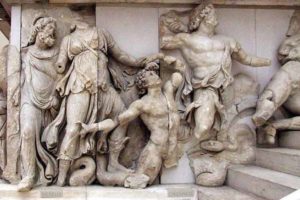A few days ago, I thought that this post you are now reading would be about Lance Armstrong. But today, there was a new story that capture America’s attention. A story that received more hype than a more threatening situation- the French deployment of troops to confront the uprising of Islamic militants in Mali. A tale more popular than the discussion that could actually affect the interpretation of your American right to property and self-protection in light of Sandy Hook.
Yet instead, similar to Armstrong, this story reveals how deep the roots of shame and self-deception can grow, how heartbreaking are their effects, and reflections on how the church should respond.
Within the last 24-hours, this post became one on a slightly different subject: the freshly delivered sensation that the inspirational tale of the death of Norte Dame Linebacker Manti Te’O’s girlfriend… was a hoax.
Believe it or not, this is the #1 or #2 most popular and “trending” story on the American news syndicates (CNN, Fox News, MSNBC, etc). For those who didn’t see the deadspin.com hoax article posted to your newsfeed on your sports fanatic Facebook friends, the saga goes as such: in September, Norte Dame team captain and Heisman Finalist Manti Te’o told post-game reporters that within hours, he had learned of the deaths of two important woman in his life: his grandmother (Annette Santiago, age 72), and his alleged Stanford undergrad girlfriend, Lennay Kekua (age 22). “Legend” has it that Te’o and Kekua meet in 2009, developed friendship where they visited each other while back home in Hawaii on breaks from school, and eventually become a couple (most of this being a “distance relationship”). And up until this last week, the story also said that Kekua was in a major car accident in the summer of 2012, and shortly thereafter, was diagnosed with Leukemia. Te’os interviews during the fall season describe him romantically calling her and writing her and her family letters to encourage them in her illness, until it finally took her life. And from this point on, Manti bore this weight, along with the burden of slowly marching up the BCS Bowl rankings to #1, to overcome all odds and to appear in the National Championship game.
Now, for responses: what wouldn’t surprise me is that a student athlete with national exposure could become the victim of a “catfish” hoax. I also would not be surprised if this hoax was one that Te’o was actually involved in formulating.
Yet, this second claim is in no way based upon knowing Te’o personally (some might suggest that I can only make such a claim being purvey to such a relationship). It is based upon a Scriptural understanding of the nature of mankind’s heart. And really, what makes this headliner not just interesting, but spiritually beneficial, is to approach it asking not “is Te’o a fraudster and a liar… how can we trust him!” but by asking “what does this sensationalism say about the nature of every human heart…and how much can we trust ourselves!”
Online comments will rage for days on whether Te’o is himself a liar or deceiver. But what this reveals is the insatiable thirst in our culture for drama. But this hunger sprouts not from our lust for entertainment. Rather, it sprouts from our heart deep vice of self-deception.
Are liars and deceivers at play? Yes, of course. But… aren’t we also play in the same league? Think of the times we have lied or exercised coercive deception, either for selfish gain, or because the benefits in the end seemed to justify the means. Regardless, if we paused to think of how ubiquitous the problem at hand really is … especially within our own speech, and in our own thoughts that contemplate deceit as a means of self protection or self gain, this really isn’t much of a story. Instead, it’s just one manifestation of the same brokenness that is inside of us all.
The size of Te’o’s hoax story is telling of much we likely try to improve our own self-image by looking for others to trample below us. The fact that Te’o is also (from all I’ve read, which I’ll admit isn’t very much) a devout Mormon attending a Catholic school I’m sure makes his tale a pin cushion for those who see themselves as fine without God, and who are eager to tout the superiority of their ethic above those who claim to follow a divinely good being.
The culture’s response is to find a target to blame, and to use this alarm to remove guilt or attention to our own faults.
The church’s response should be one that contemplates the weight of self-deception from this story. Both the self-deception to think of ourselves as more noble or high than those like Te’o, as well as the self-deception to not pursue a life of holiness by not taking a moment and to reflect and confess of how the same thoughts manifest themselves in our words, actions, and guises as well.
I can understand the shock of learning that you have been lied to. The virtues of trust, of loyalty, and faith all become fissures and cracked inside us, and the light of hope that these three radiate becomes dimmer. Truly, the souls of victims wear the collateral damage of lies and deception. But we must not neglect the damage that the soul can cause itself. Let us not join the muck-ruckers looking for another to tear down. Rather, through self-reflection, let us explore our own souls, and be humbled by our own need for grace. And who knows the joy we will find in our walk until the Parousia when we find ourselves acting as proverbial Christ’s standing lovingly over the prostitutes, rather than as those ready to throw the stone.





3 Comments
Leave your reply.